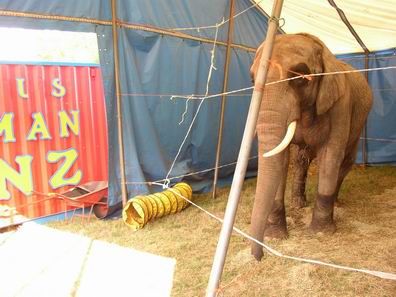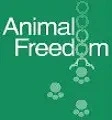Unavoidable welfare problems with circus animals |
The Dutch government has banned the use of wild mammals in circuses. This ban has been in effect since September 15, 2015. Circuses are no longer allowed to use wild mammals in their performances. They are also not allowed to transport these animals for this purpose.
The article below was written long before this ban came into effect.
Written by Fabian Gort. Fabian is a biologist and has studied welfare issues among circus animals. |
Animal welfare issues among originally wild animals in the circus
Summary
 In particular for wild species accommodation is
a threat to their wellbeing, especially in
the winter. Domestic animals are easier to
accommodate. Training doesn't necessarily
has to create problems for their wellbeing,
provided that they are taught by means of reward
and provided that animals are used that don't
mind performing, like dogs. The display of
tricks is a routine occupation for animals
and this can only be seen as acceptable when
an animal trainer respects the fact that animals
sometimes don't want to perform. Transport
is an unclear issue, but although habituation
may set in, most animals will experience transport
in the initial stage as very stressful. In particular for wild species accommodation is
a threat to their wellbeing, especially in
the winter. Domestic animals are easier to
accommodate. Training doesn't necessarily
has to create problems for their wellbeing,
provided that they are taught by means of reward
and provided that animals are used that don't
mind performing, like dogs. The display of
tricks is a routine occupation for animals
and this can only be seen as acceptable when
an animal trainer respects the fact that animals
sometimes don't want to perform. Transport
is an unclear issue, but although habituation
may set in, most animals will experience transport
in the initial stage as very stressful. |
Welfare issues
The welfare issues for circus animals can roughly
be divided into five aspects, namely: (1) accommodation,
(2) transport, (3) training, (4) performance
and (5) winter accommodation. To analyse these
aspects on welfare-issues I will use the five
liberties, as defined by the British animal welfare
committee (Brambell 1965) as a framework. These
liberties act as a guide-line for the European
policy regarding intensively farmed animals to
safeguard there welfare.
- Freedom from thirst, hunger and malnutrition.
- Freedom from discomfort due to environment.
- Freedom from pain, injury and disease.
- Freedom to express the normal behavioural
characteristics peculiar to the species.
- Freedom from fear and distress.
It's of interest here to distinguish between
welfare-violation that can be prevented, for
example not giving enough water (not giving enough
water is a case of neglect) and unavoidable welfare-violation,
like transport (the transportation of animals
is inherent to the character of a circus). Unavoidable
welfare violation can be a just cause to ban
circuses. |
Accommodation
Domestic animals can in general be kept in sufficient
large enclosures. (However, one can speculate
whether a circus-horse should have the freedom
to trot). In general speaking, wild animals are
more dangerous and more unpredictable. Therefore
there are stricter rules to their accommodation.
Especially primates, bears, elephants and wild
cats have to pay a high price for freedom of movement;
this limits their normal behaviour (freedom 4).
Also enrichment is usually not possible: a chimpanzee
likes to climb, but circus-accommodation lacks
climbing-facilities. Through such privation many
circus-animals display stereotypical or apathetic
behaviour, which can be considered as mental
sorrow (freedom 5). |
Transport
As long as the duration of transport is within
restricted range and the transport cages are
adequate and comfortably equipped, some will
argue that this is an acceptable aspect. Yet
there is a lot of uncertainty as to whether
circus animals experience transport as stressful
(freedom 5). It is known that a once-only transport
of farm animals is experienced as very stressful.
Circus animals are often put on transport and
it's not known whether they get used
to it. Each time the animals gets transported
they have to get used to a new, for them hostile
environment. |
Training
On the subject of teaching acts on animals
there's big controversy. The circuses
personal most often argue that they train their
animals by successive approximation, which
means the gradual learning of behaviour. A
lion that has to jump through a burning hoop
can for example first be taught to jump through
a normal hoop. Subsequently the fire which
he has to jump through will be made bigger
so that the lion gradually gets used to the
fire. Animal welfare people are inclined to
believe that circus-animals only get trained
by means of torture instruments. Though they
are known, horrific cases, this should not
be generalized. For example: some dog-owners
teach their dogs tricks in a harsh manner,
but most teach them with rewards. However it
should be reminded that not all animals are
so keen on learning tricks as dogs do. Cats
are self-willed and will not often perform
for a reward. Moreover, with big wild animals
it's of importance that an animal trainer
creates a dominant position over his animals.
Some degree of physical force seems to be unavoidable
(freedom 3 & 5). Besides, some tricks
are too difficult to learn for wild animals
to do through the approximate approach. Training
isn't necessarily cruel as long as long
as animals are used that enjoy learning to
perform and this is done by means of reward
and as long as the tricks do not cause them
stress. |
Performance
It is sometimes stated that circuses
are more animal friendly than zoo's are,
because they at least seek distraction during
their performances. However, then it is assumed
that they enjoy performing. That assumption is
unfounded. The acts are in general routinely
and compulsive, which can cause boredom and even
aversion (freedom 5). Animals that display enjoyment
in acting out tricks are exceptions to the rule. |
Winter accommodation
The condition of the winter accommodation is
most often poorly. For domestic animals it's
quite possible to accommodate them in good
conditioned housing. For a number of animals,
in particularly wild animals, winter accommodation
is problematic, because they can't adjust
to another climate. The animals are then kept
in a small enclosure so the climatic-conditions
can be controlled or they are kept outside
where the climatic-conditions can not be controlled
(freedom 2 & 4). |
|
|
|
|
| |

